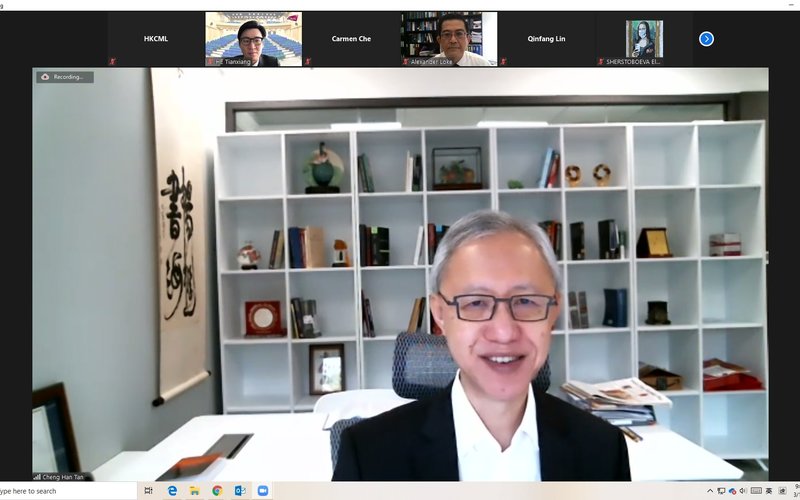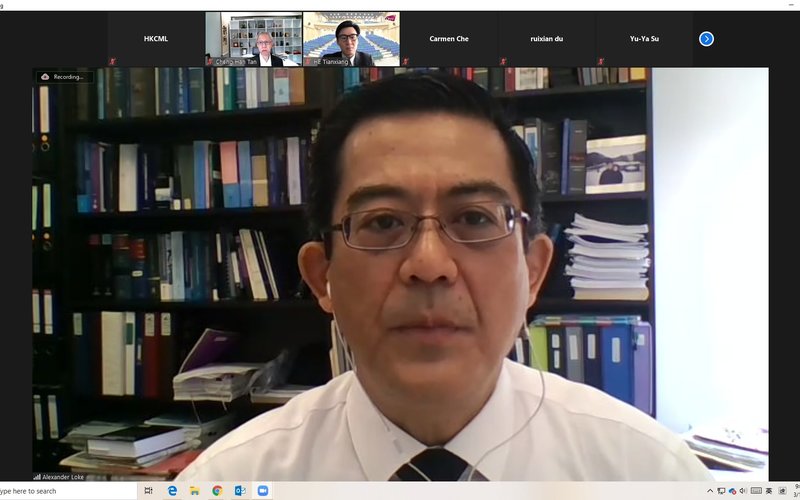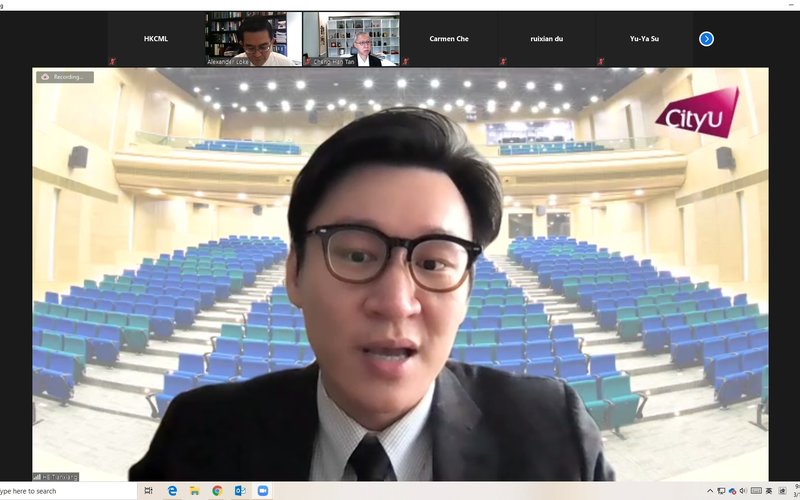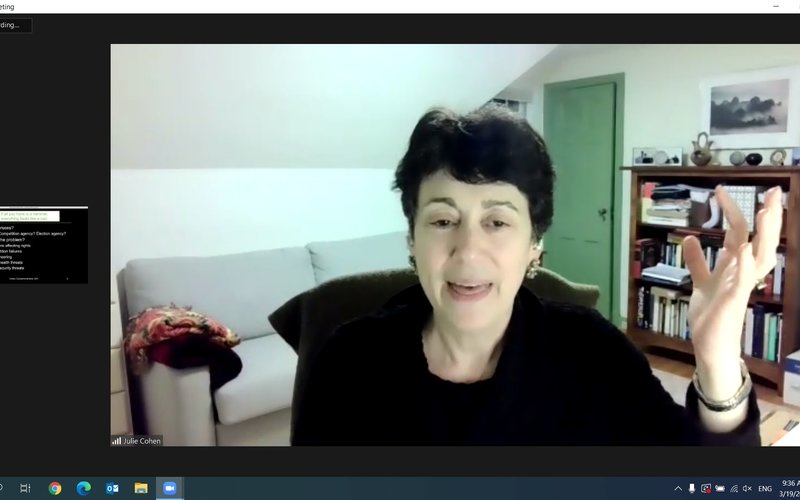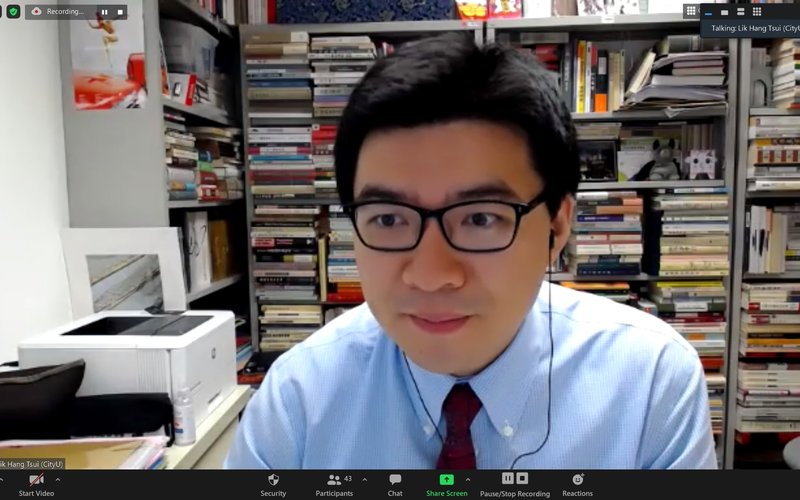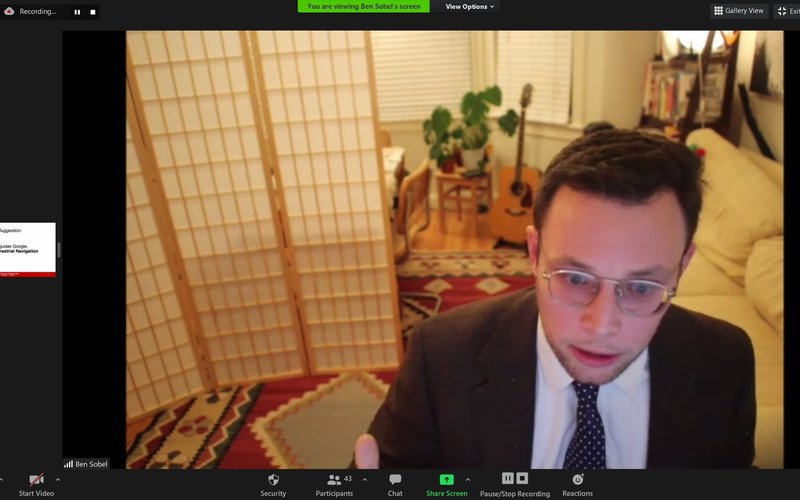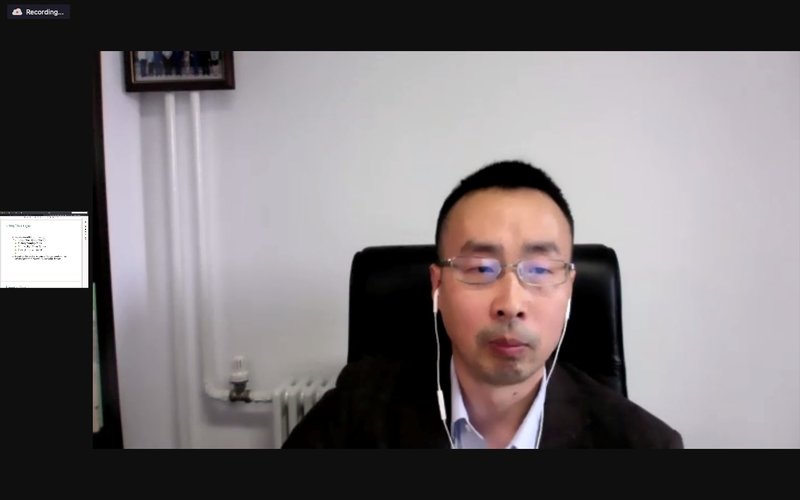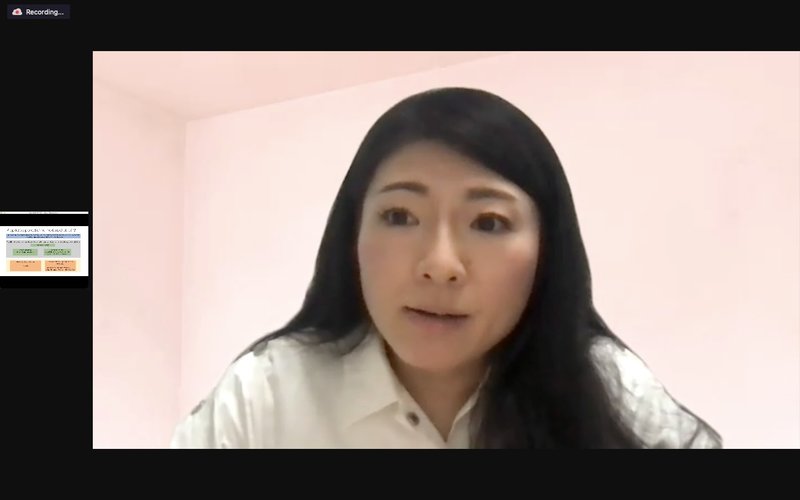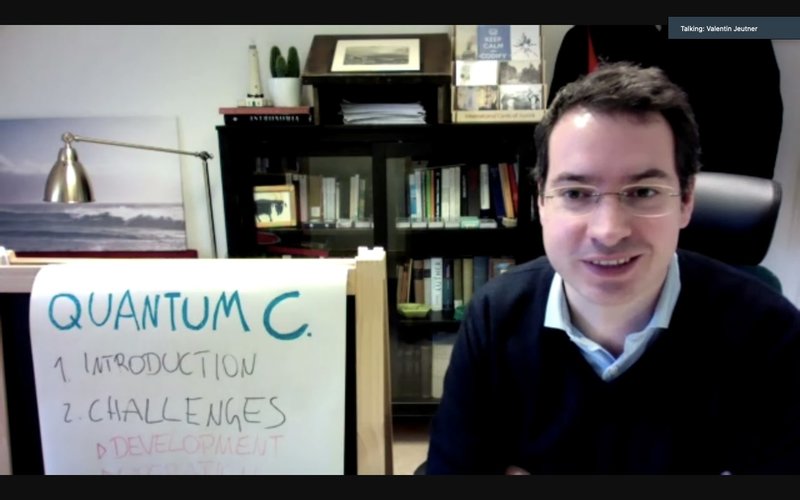Latest News
HKCML: Conference on Law, Technology and Disruption
Technological changes and innovations are inevitable and very much linked to the success of a country. However, new technologies may represent a destructive power or at least a disruptive power to the current legal system that requires responses from every country.
To discuss how a certain technology “disrupts” law and society and how our regulative framework should as a whole respond and adapt, CityU School of Law organised a three-day conference entitled the “Law, Technology and Disruption” from 19 to 21 March 2021. The Conference brought together scholars from the US, the UK, Europe, Japan, Africa, Hong Kong and China to discuss five new technologies, namely: Artificial Intelligence (AI) and big data, internet platforms, blockchain, biotech, and Augmented Reality (AR) and Virtual Reality (VR).
The Conference started off with welcome remarks by Prof TAN Cheng-Han (Dean and Chair Professor of Commercial Law, CityU School of Law). Prof Tan welcomed all participants and thanked speakers for sharing their ideas. Thereafter, Prof Alexander LOKE (Director of HKCML) welcomed participants on behalf of the Centre and expressed his hope that the ideas brought out in the Conference could help them actively think about the relevance to their own jurisdiction. The Conference coordinator Dr HE Tianxiang then explained the background and objectives of the Conference. He hoped that the Conference would promote and have substantial impact on legal and policy developments.
Prof Julie COHEN (Georgetown University, Georgetown University Law Center) gave a keynote presentation on “Designing Information-Era Countermovements”. This was then followed by six panel discussions.
The first panel, chaired by Dr Lik Hang TSUI (CityU, CLASS), was entitled “AI, Algorithm and Big Data”. There were three speakers in this panel. Mr Benjamin SOBEL (Harvard University, Harvard Berkman Klein Center for Internet & Society) spoke on “Information Policy for Search Engines”. Prof Jyh-An LEE (Chinese University of Hong Kong, Faculty of Law) spoke on “Legal Implications of the AI Ethics”; and Prof Masabumi SUZUKI (Nagoya University, Graduate School of Law) gave a presentation on “Promotion of Data Economy and Intellectual Property: Some Lessons from Japanese Experiences”.
The second panel “Augmented Reality” was chaired by Dr Eugene LIM (CityU School of Law). Prof Wian ERLANK (North-West University, Faculty of Law) discussed “Dephysicalisation or Rephysicalisation of property in AR and VR”; and Dr Michael KATELL (The Alan Turing Institute) spoke on “Fuel to the Fire: Will Pandemic Panic Add to an Already Uncertain Regulatory Landscape for Augmented Reality Technology?”
The third panel “Disruption & Regulation, Tech & Society” was chaired by Dr Chenguo ZHANG (Shanghai Jiaotong University, KoGuan Law School). This consisted of three presentations. Prof Guobin CUI (Tsinghua University, School of Law) spoke on “The Eligibility Requirements for Legal Protection of Publicly Accessible Datasets”. Dr Hin-Yan LIU (University of Copenhagen, Faculty of Law) and Mr Matthijs MAAS (University of Copenhagen, Faculty of Law) jointly presented on “Solving of X? Towards a Problem-finding Framework to Ground Long-term Governance Strategies for Artificial Intelligence”. Dr Valentin JEUTNER (Lund University, Faculty of Law) presented his paper on “Regular and Irregular Regulatory Challenges of Quantum Computing”; and Ms Victoria SOBOCKI (University of Copenhagen, Faculty of Law) spoke on “Avoiding the Gilded Cage of Tech, Striking the Balance Between Too Little and Too Much Technology: Artificial Intelligence and Legal disruption”.
The fourth panel on “Blockchain” was chaired by Dr Jiaying Christine JIANG (New York University, School of Law). Prof Kelvin LOW (CityU School of Law) presented on “Confronting Cryptomania”. Prof Megumi HARA (Gakushuin University, School of Law) presented on “The Significance of Digital Asset: Analysis of Proprietary Nature”; and Prof David FOX (University of Edinburgh, School of Law) spoke on “Tokenized Assets in Private Law”.
The fifth panel “Platforms” was chaired by Dr Julia TOMASSETTI (CityU School of Law). Dr SHEN Weiwei (China University of Political Science and Law, School of Law) spoke on “Against Algorithmic Transparency”. Dr HE Tianxiang (CityU School of Law) spoke on “Content Platforms, Copyright and Freedom of Speech in China”. Dr Xin DAI (Peking University, Law School) presented his paper on “Data Platforms inside the Administrative State”; and Dr Mateja DUROVIC (King’s College of London, The Dickson Poon School of Law) presented on “The Challenges of Consumer Protection in the Age of Online Platforms”.
The last panel “Biotech, Gene Drive” chaired by Dr Li JIANG (Tongji University, Shanghai International College of Intellectual Property). Presentation was given by Dr Yaojin PENG (Chinese Academy of Sciences, Institute of Zoology) on “A Rethink of the Right to Withdraw from Research in Biobanking in China”. Prof Anselm KAMPERMAN-SANDERS (Maastricht University, Faculty of Law) discussed “The Secret Life Plants – Wondrous Composition Policies for Songs in the Key of Life”; and Dr Sven J.R. BOSTYN (University of Copenhagen, Faculty of Law) spoke on “COVID-19, Access to Medical Treatments and Technological and Transactional Opacity.”
Prof Roger BROWNSWORD closed the Conference with a keynote presentation on “Law and Respect: Another Case of Technological Disruption”.
The three-day Conference ended with the closing remarks by Prof Alexander LOKE and Dr HE Tianxiang. Both thanked the presenters for their thought-provoking ideas and the participants for their searching questions and insightful comments.
Selected conference papers will be published in a special issue in Law, Innovation and Technology journal.
科技變革和創(chuàng)新是不可避免的,並且與一個(gè)國(guó)家的成功息息相關(guān)。 但是,創(chuàng)新科技可能會(huì)為目前的法律體系的帶來(lái)顛覆性的影響,或者至少是巨大的衝擊,而這需要每個(gè)國(guó)家都做出回應(yīng)。
為了探討某種科技如何「衝擊」法律和社會(huì),以及各國(guó)法律框架的應(yīng)對(duì)和適應(yīng),香港城市大學(xué)(以下簡(jiǎn)稱城大)法律學(xué)院屬下香港商事和海事法律中心(HKCML)於2021年3月19日至21日舉辦了為期三天的網(wǎng)上研討會(huì),題為“法律,科技與衝擊”。會(huì)議邀請(qǐng)了來(lái)自美國(guó),英國(guó),歐洲,日本,非洲,香港和中國(guó)大陸的學(xué)者,針對(duì)五種典型的創(chuàng)新科技進(jìn)行了討論,包括:人工智能和大數(shù)據(jù),互聯(lián)網(wǎng)平臺(tái),區(qū)塊鏈,生物科技以及擴(kuò)增實(shí)境和虛擬實(shí)境。
會(huì)議以陳清漢教授(城大法律學(xué)院院長(zhǎng)及商業(yè)法講座教授)的致歡迎致辭開始。陳教授熱烈歡迎所有與會(huì)者,並感謝演講者撥冗出席及分享。此後,HKCML主任陸飛鴻教授代表中心歡迎與會(huì)者,並希望各位能積極思考會(huì)議中提出的想法與各法域的相關(guān)性。會(huì)議統(tǒng)籌何天翔博士向與會(huì)者解釋了本次會(huì)議的背景和目標(biāo)。他希望透過此會(huì)議能促進(jìn)並影響各地區(qū)的法律和政策發(fā)展。
Julie Cohen教授 (佐治城大學(xué)法律中心) 以“設(shè)計(jì)信息時(shí)代的對(duì)策” 為題進(jìn)行了主題演講。 及後從六個(gè)方面進(jìn)行小組討論。
第一節(jié)由徐力恆博士(城大人文社會(huì)科學(xué)院)主持,主題為“ 人工智慧,算法和大數(shù)據(jù)”。 本環(huán)節(jié)的三位講者分別是Benjamin Sobel先生(哈佛大學(xué)伯克曼互聯(lián)網(wǎng)與社會(huì)研究中心),李治安副教授(香港中文大學(xué)法律學(xué)院)和鈴木將文教授(名古屋大學(xué)法科大學(xué)院),他們以“搜索引擎的信息政策”,“人工智能的道德倫理法律含義”和“推廣數(shù)據(jù)經(jīng)濟(jì)與知識(shí)產(chǎn)權(quán):日本的經(jīng)驗(yàn)與教訓(xùn)”為主題發(fā)表演講。
第二節(jié)主題為“擴(kuò)增實(shí)境與虛擬實(shí)境”,在Eugene Lim博士(城大法律學(xué)院)的主持下,本環(huán)節(jié)的兩位講者Wian Erlank教授(南非西北大學(xué)法律學(xué)院)和Michael Katell博士(艾倫圖靈研究院)以下列主題發(fā)表演講“ 擴(kuò)增實(shí)境和虛擬實(shí)境中財(cái)產(chǎn)的非實(shí)體化或?qū)嶓w化”和“火上澆油:流行性恐慌會(huì)對(duì)擴(kuò)增實(shí)境技術(shù)增添監(jiān)管環(huán)境的不確定性嗎?”。
第三節(jié)“破壞與監(jiān)管,科技與社會(huì)”由張陳果副教授(上海交通大學(xué)凱原法學(xué)院)主持,由崔國(guó)斌副教授(清華大學(xué)法學(xué)院),Hin-Yan Liu副教授(哥本哈根大學(xué)法學(xué)院),Matthijs Maas先生(哥本哈根大學(xué)法學(xué)院),Valentin Jeutner博士(隆德大學(xué)法學(xué)院)和Victoria Sobocki女士(哥本哈根大學(xué)法學(xué)院)作三場(chǎng)演講。 演講題目包括“可公開訪問的資料集的法律保護(hù)資格要求”,“解決未知數(shù)? 建立一個(gè)以問題為基礎(chǔ)的框架為人工智能的長(zhǎng)期管治策略奠定基礎(chǔ)”,“量子計(jì)算的常規(guī)和非常規(guī)監(jiān)管挑戰(zhàn)”和“避免科技的約束,在太少和太多科技之間尋求平衡:人工智能和法律破衝擊”。
第四節(jié)關(guān)於“區(qū)塊鏈”的專題討論由姜嘉瑩博士(紐約大學(xué)法學(xué)院)主持,並由劉發(fā)健教授(城大法律學(xué)院),原惠美教授(學(xué)習(xí)院大學(xué)法學(xué)部)和David Fox教授(愛丁堡大學(xué)法學(xué)院)作演講。演講主題為“直面加密貨幣的狂潮”,“數(shù)字資產(chǎn)的意義:從所有權(quán)性質(zhì)分析”和“私法中的代幣化資產(chǎn)”。
第五節(jié)專題討論“平臺(tái)”由Julia Tomassetti博士(城大法律學(xué)院)主持。由沈偉偉副教授(中國(guó)政法大學(xué)法學(xué)院),何天翔博士(城大法律學(xué)院),戴昕副教授(北京大學(xué)法學(xué)院),Mateja Durovic博士(倫敦國(guó)王學(xué)院潘迪生法律學(xué)院)以主題“反對(duì)演算法的透明度”,“內(nèi)容平臺(tái),版權(quán)和言論自由在中國(guó)”,“行政國(guó)家內(nèi)部的數(shù)據(jù)平臺(tái)”和“線上平臺(tái)時(shí)代的消費(fèi)者保護(hù)挑戰(zhàn)”發(fā)表論文演講。
由蔣莉副教授(同濟(jì)大學(xué)上海國(guó)際知識(shí)產(chǎn)權(quán)學(xué)院)主持的最後一節(jié)專題討論的主題為“生物科技,基因驅(qū)動(dòng)”。彭耀進(jìn)副研究員(中國(guó)科學(xué)院動(dòng)物研究所),Anselm Kamperman-Sanders教授(馬斯特里赫特大學(xué)法學(xué)院)和Sven J.R. Bostyn副教授(哥本哈根大學(xué)法學(xué)院)以“ 重新思考中國(guó)生物銀行研究的退出”,“植物的秘密生命”和“ COVID-19,藥物治療以及技術(shù)和交易的不透明性” 為題發(fā)表演講。
最後,由Roger Brownsword教授以“法律與尊重:另一科技衝擊的案例”作主題演講,結(jié)束所有專題討論。
為期三天的會(huì)議以陸飛鴻教授和何天翔博士致閉幕辭結(jié)束,兩位主辦方代表再次感謝各位演講者作出發(fā)人深省的演講和所有與會(huì)者獨(dú)到提問和有見地的評(píng)論。
本次會(huì)議上發(fā)表的精選論文將會(huì)在《法律,創(chuàng)新與科技》期刊以特刊發(fā)表。













